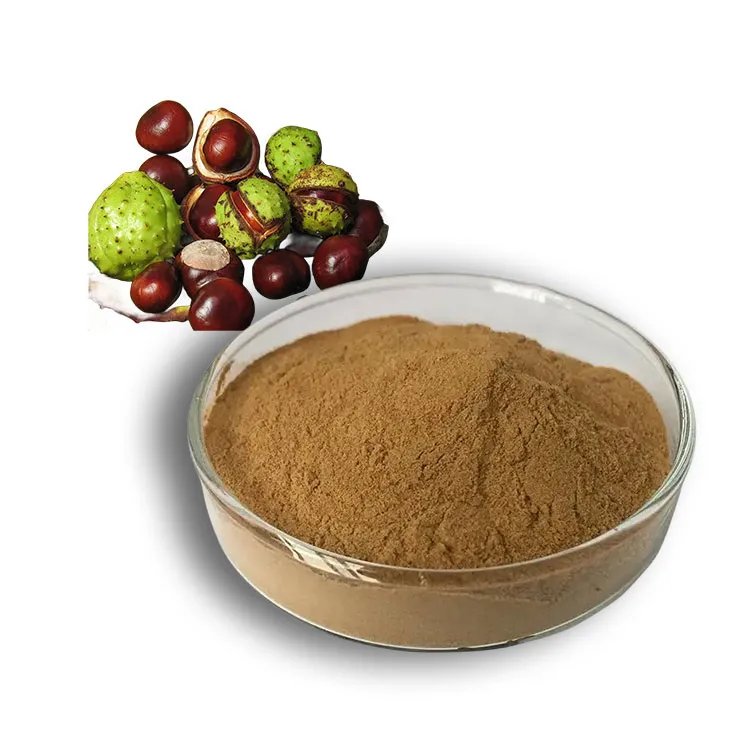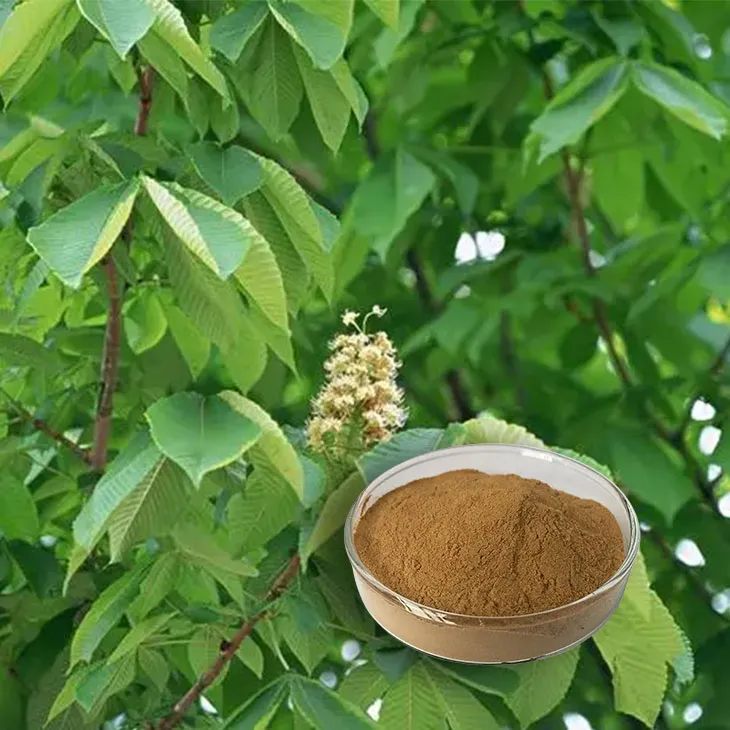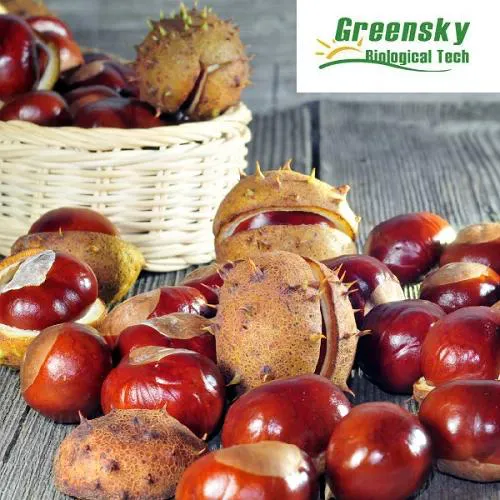- 0086-571-85302990
- sales@greenskybio.com
Does horse chestnut extract have benefits for diabetes? Are these all safe and applicable for diabetic patients?
2024-11-13

1. Introduction
Diabetes is a chronic metabolic disorder that affects millions of people worldwide. It is characterized by elevated blood glucose levels due to either insufficient insulin production (Type 1 diabetes) or ineffective use of insulin (Type 2 diabetes). As a result, patients are constantly seeking alternative and complementary therapies to manage their condition. Horse Chestnut Extract has emerged as a potential candidate in this regard. However, its benefits and safety for diabetic patients are still a subject of debate and research.

2. What is Horse Chestnut Extract?
Horse Chestnut Extract is derived from the seeds of the Aesculus hippocastanum tree. It contains several active compounds, with aescin being the most notable. Aescin has been studied for its potential anti - inflammatory, antioxidant, and vasoprotective properties.

3. Potential Benefits for Diabetes
3.1 Blood Glucose Regulation
Some studies suggest that horse chestnut extract may play a role in blood glucose regulation. It is proposed that certain components in the extract may interact with the body's metabolic pathways involved in glucose metabolism. For example, it may enhance insulin sensitivity, allowing cells to better respond to insulin and take up glucose from the bloodstream more effectively. However, the exact mechanisms underlying this effect are not fully understood, and more research is needed to confirm these findings.
3.2 Vascular Health
Diabetic patients are at high risk of developing vascular complications. Horse chestnut extract, with its vasoprotective properties, may offer some benefits in this area. It may help to improve the integrity of blood vessels by reducing inflammation and oxidative stress. By maintaining healthy blood vessels, it could potentially reduce the risk of diabetic retinopathy, neuropathy, and nephropathy, which are all related to damaged blood vessels in diabetes.
3.3 Anti - Inflammatory Effects
Chronic inflammation is often associated with diabetes. Horse chestnut extract's anti - inflammatory properties may help to dampen this systemic inflammation. By reducing inflammation, it may contribute to better overall health in diabetic patients and potentially assist in the management of the disease. For instance, it may help to reduce inflammation in adipose tissue, which is known to be involved in insulin resistance in Type 2 diabetes.

4. Safety Concerns for Diabetics
4.1 Blood - Sugar - Lowering Medications Interaction
One of the major safety concerns is the potential interaction with blood - sugar - lowering medications. If horse chestnut extract also has blood glucose - lowering effects, taking it in combination with medications such as metformin or insulin could lead to hypoglycemia (dangerously low blood sugar levels). Diabetic patients need to be extremely cautious when considering adding horse chestnut extract to their treatment regimen and should consult their healthcare provider first.
4.2 Allergic Reactions
Some individuals may be allergic to horse chestnut extract. Allergic reactions can range from mild skin rashes to more severe anaphylactic shock. People with a history of allergies, especially to plants or plant - based products, should be particularly vigilant when considering the use of horse chestnut extract.
4.3 Hepatic and Renal Toxicity
There have been some reports of hepatic and renal toxicity associated with horse chestnut extract in high doses. Since diabetic patients may already have compromised liver or kidney function, the use of horse chestnut extract may pose an additional risk to these organs. Regular monitoring of liver and kidney function may be necessary if a diabetic patient decides to use the extract.
5. Research Evidence
Several pre - clinical and some clinical studies have been conducted on horse chestnut extract and its relation to diabetes. Pre - clinical studies in animal models have shown promising results in terms of blood glucose regulation and vascular protection. However, these results do not always translate directly to human patients.
In clinical trials, the evidence is more mixed. Some small - scale trials have reported positive effects on symptoms related to diabetes, such as improved circulation and reduced edema. But larger, more comprehensive trials are still lacking. Moreover, the design and methodology of these existing trials have been criticized for various reasons, including small sample sizes and short - term follow - up periods.
6. Recommendations for Diabetic Patients
Given the current state of knowledge, diabetic patients should approach the use of horse chestnut extract with caution.
- First and foremost, they should consult their healthcare provider. The healthcare provider can assess the patient's individual situation, including their diabetes type, current medications, and overall health status.
- If a patient decides to try horse chestnut extract, they should start with a very low dose and closely monitor their blood glucose levels, as well as any potential side effects.
- Patients should also be aware of the signs of allergic reactions, hypoglycemia, and any signs of liver or kidney problems and report them immediately to their healthcare provider.
7. Conclusion
Horse chestnut extract shows some potential benefits for diabetes in terms of blood glucose regulation, vascular health, and anti - inflammatory effects. However, significant safety concerns exist, particularly in relation to interactions with medications, allergic reactions, and potential organ toxicity. More high - quality research is needed to fully understand its effects and safety profile in diabetic patients. Until then, diabetic patients should rely on the advice of their healthcare providers when considering the use of horse chestnut extract.
FAQ:
Question 1: What is horse chestnut extract?
Horse chestnut extract is derived from the seeds of the horse chestnut tree (Aesculus hippocastanum). It contains various compounds, such as aescin, which is thought to have certain biological activities.
Question 2: How could horse chestnut extract potentially benefit diabetes?
Some studies suggest that horse chestnut extract may have benefits for diabetes through its potential effects on blood circulation. Improved blood circulation could help in better glucose distribution in the body. It may also have anti - inflammatory properties that could be beneficial as diabetes is often associated with inflammation. However, more research is needed to confirm these effects.
Question 3: Are there any direct effects of horse chestnut extract on blood sugar levels?
There is currently no conclusive evidence showing that horse chestnut extract directly affects blood sugar levels. While some mechanisms suggest potential indirect benefits related to diabetes management, the impact on blood glucose control remains uncertain.
Question 4: What are the safety concerns for diabetics regarding horse chestnut extract?
Horse chestnut extract can be toxic if not properly processed. It may cause side effects such as nausea, vomiting, and stomach upset. Additionally, it may interact with medications that diabetics often take, such as blood thinners. Diabetics should consult their healthcare providers before using horse chestnut extract to avoid potential risks.
Question 5: How should diabetics use horse chestnut extract if it is considered safe?
If a diabetic patient is advised by a healthcare professional that horse chestnut extract may be safe for them, they should follow the recommended dosage precisely. It is usually taken in supplement form, and proper storage and quality control of the product are essential. Regular monitoring of any potential side effects and communication with the doctor during use are also crucial.
Related literature
- The Effects of Horse Chestnut Extract on Diabetic Complications"
- "Safety and Efficacy of Botanical Supplements, including Horse Chestnut Extract, in Diabetes Management"
- "Horse Chestnut Extract: A Review of its Potential Role in Diabetes and Associated Vascular Health"
- ▶ Hesperidin
- ▶ Citrus Bioflavonoids
- ▶ Plant Extract
- ▶ lycopene
- ▶ Diosmin
- ▶ Grape seed extract
- ▶ Sea buckthorn Juice Powder
- ▶ Fruit Juice Powder
- ▶ Hops Extract
- ▶ Artichoke Extract
- ▶ Mushroom extract
- ▶ Astaxanthin
- ▶ Green Tea Extract
- ▶ Curcumin
- ▶ Horse Chestnut Extract
- ▶ Other Product
- ▶ Boswellia Serrata Extract
- ▶ Resveratrol
- ▶ Marigold Extract
- ▶ Grape Leaf Extract
- ▶ New Product
- ▶ Aminolevulinic acid
- ▶ Cranberry Extract
- ▶ Red Yeast Rice
- ▶ Red Wine Extract
-
Apricot Powder
2024-11-13
-
Cocoa Extract
2024-11-13
-
Almond Extract Powder
2024-11-13
-
Curcumin Extract
2024-11-13
-
Ginger Extract
2024-11-13
-
Epimedium extract powder
2024-11-13
-
Motherwort Extract
2024-11-13
-
Black Garlic Extract
2024-11-13
-
Panax Ginseng Leaf Extract
2024-11-13
-
Pueraria Lobata Extract
2024-11-13





















